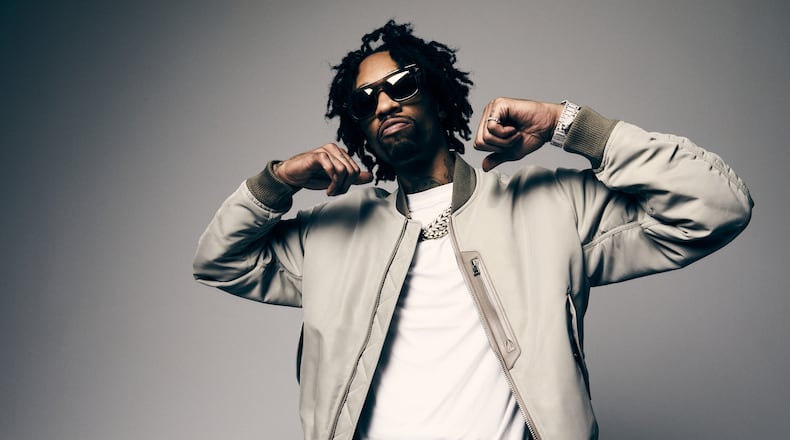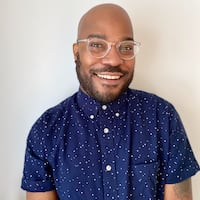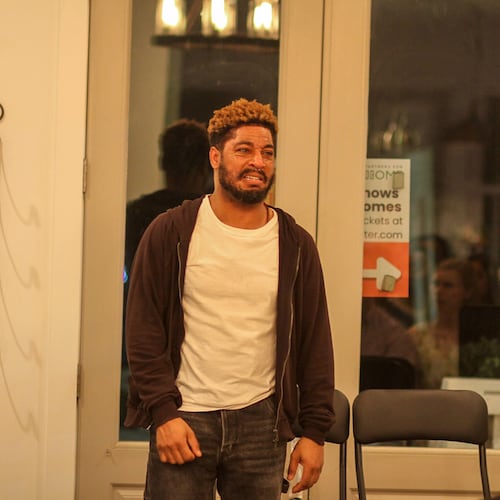On a fall Saturday afternoon, Sonny Digital sits in the middle of his at-home studio.
The tall, lanky musician’s body folds into a black leather desk chair, eyes fixated on his 6-year-old son, affectionately called “Little Sonny,” holding a rubber glove filled with water in his tiny hands — a DIY water balloon.
Credit: Jimmy Fontaine
Credit: Jimmy Fontaine
“Did you make a mess, bro?” he asks his son, who just stares, pushing the glove further into Dad’s face. “Oh, you want me to tie it up?”
The studio is a corner space in the townhome of the 32-year-old Grammy-nominated multi-platinum producer. Crammed into the nook are a red couch, a mic stand, four keyboards, a desk, MPCs, computer monitor and two guitars. The walls feature a flat-screen TV, countless gold and platinum plaques and a proclamation from the City of Atlanta. It’s a white space filled with framed memories of success stories that span more than a decade.
In between dad duties, he’s talking about “Dolores Son,” his project coming out on Generation Now/Atlantic Records in less than a week. It’s his first solo album, the product of committing himself fully to rapping. It’s a welcome change for Digital, who says he feels his career is starting over again. All 11 songs feature Digital on the mic, zeroing in on his bars rather than the beats.
“I’ve been around for a long time,” he says. “A lot of the people know me, so they know that I do this too.”
Credit: Courtesy of Atlantic Records
Credit: Courtesy of Atlantic Records
The talented Mr. Digital
In 2011, Sonny Digital, the Michigan-born Atlanta-raised upstart with an affinity for trap producers such as Shawty Redd and Drumma Boy, got a major break when he landed six songs on Gorilla Zoe’s “King Kong.” That was followed by producing YC’s “Racks” which featured Future. The gold record would eventually mark a turning point in the career of its producer and guest star.
Since then, Digital’s catalog includes more than a billion streams and a track list of hits for everyone from Beyoncé (“I Been On”) and Future (“Same Damn Time”) to iLoveMakonnen (“Tuesday”) Travis Scott (“Stargazing”), 50 Cent (“I’m the Man”) and Don Toliver (“After Party”). In addition to his skills behind the boards, he released an EP called “G.O.A.T” in 2016, which was followed by two collaborative mixtapes – “Black Goat” and “Black Goat 2″ – with Decatur rapper Black Boe.
“I started to realize people didn’t know who I was,” he says about the inspiration behind “Dolores Son.” “People thought I was some mystic creature.”
It’s his fault, Digital says. As a producer, you’re not typically known for your voice, so it makes sense that average music fans might miss that the guy behind some of their favorite songs can also rap. “I feel like my whole life I’ve been kind of open; you just weren’t paying attention,” he admits. “As an artist, I kind of got to be vocal, bring people in.”
Listening to “Dolores Son” it’s clear Digital wants the focus to be on what he’s saying.
The vulnerable nature of the lyrics and the autobiographical approach to the storytelling led its creator to take a more personal approach. He’s released three singles: “Like This,” “Could Be Worse,” and “Gotta Slide.” The latter he wrote after the shooting death of his friend, rapper PnB Rock.
Rather than a super producer grappling with the trappings of fame, the album features Digital sharing insights about a kid whose family moved around a lot, landed in metro Atlanta, met his first set of real friends in Gwinnett County, and on being the child of an illegal immigrant. The chorus of a song like “Can’t Blame You” (“Daddy was a scammer/Mama worked in fast food, Mrs. Winners in Atlanta”) finds Digital coming to terms with his childhood. He was more hands-off on production for the album, giving way to frequent collaborators such as Spiff Sinatra, D. Rich, Don Cannon, Vintage Jagg, and $lugg, he did admit to tinkering and toying with every track on the album.
Mostly, his focus was on writing.
‘Don’t really do gatekeeping’
In the studio, Digital is helping his son pick out Oreo cookies from a container while he and his longtime manager Rico Brooks are talking about legacy and how far they’ve come together. Brooks recalls when “Racks” was released and Digital was not old enough to enter the club on promo runs. He was uploading his new music to MySpace.
At the time, Digital was also facing the loss of his father, who died in a car accident in his native Nigeria. He couldn’t attend his dad’s funeral because of the demands of being a rising star with his first major hit in the industry. He had to settle for watching a video of the service recorded by his older brother. “I was getting into my life, so it was kind of hard to just kind of just stop,” he says. “I was trying to get to know my dad. I ain’t going to say it didn’t affect me.”
Like his father before him, Digital says he always shows up for his family. He also creates spaces for other creatives to gather and connect. During the pandemic, he took to the social media platform Clubhouse to launch Club Digital. That web space went physical when he turned his Westside studio into the official Club Digital, an event and gathering space. “Me having the studio, people will gravitate towards me because I had the doors open,” he says. “I don’t really do gatekeeping.”
It’s those genuine connections in an ego-driven business that are lasting, says Brooks.
“I remember when I was studying the Harlem Renaissance, how the creators would just get together,” he says, citing Digital’s previous spot, 516 Studios, where running into contemporaries like Metro Boomin would be a regular occurrence. “Those creators would just come through there, and then you see them years later, and they’re doing their own thing, but they all connected.”
On top of that, Digital is constantly thinking about what artists can and should do next to keep evolving.
“Right now I feel like I’m in a blender,” he says about today’s music industry. “I’m thinking, what’s another way to break music other than TikTok? Where do Kendrick Lamar fans live? I know they’re not on TikTok. How do you get to that crowd?”
There are no immediate plans to take his show on the road, but first there’s a free show at Center Stage in Atlanta on Nov. 3. He wants to let the album breathe and get honest feedback on his writing. He wants to do a couple more spot dates to promote “Dolores Son,” release another project, and potentially go on tour. There is also talk of shifting Club Digital to being fully devoted to music, nixing the event element.
“You could really do whatever you want to do,” he says. “Just because you’re a great sweeper doesn’t mean you can’t be great at vacuuming. You ain’t bound. You can be multifaceted.”
FREE SHOW
Sonny Digital
8 p.m. Friday, Nov. 3. Free. Center Stage, 1374 W. Peachtree St. NW, Atlanta. RSVP via the link at instagram.com/sonnydigital.
About the Author
Keep Reading
The Latest
Featured






